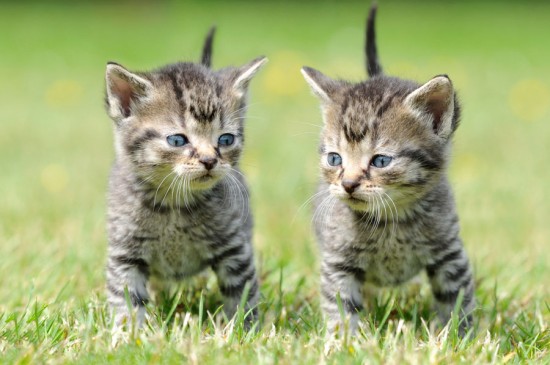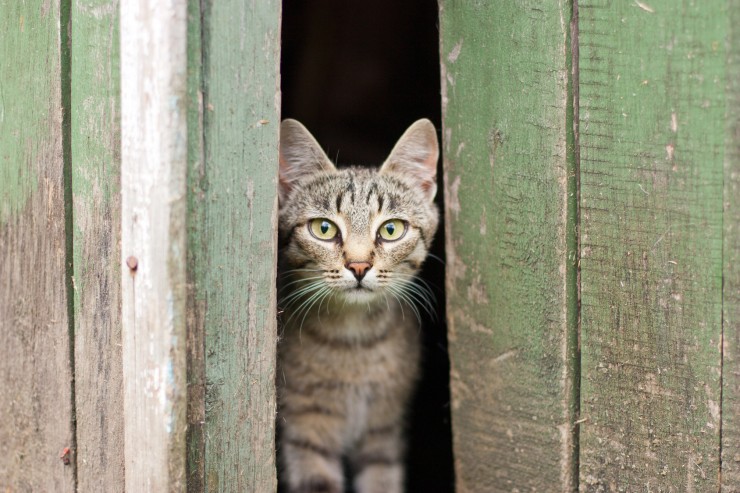

If you are thinking about getting a cat for the first time, you may have wondered whether it would be a good idea to get two, or perhaps you thought that cats are rather solitary animals that prefer to live by themselves. In Rudyard Kipling's famous 'Just-So' stories, the tale of 'The Cat that Walked By Himself' gives a fictionalised account about how all wild animals became domesticated by Man, apart from the cat who preferred to be independent, but in real life, most cats do prefer some company of their own kind as well as that of their owners.
In purely practical terms, if you have two cats that are on reasonably good terms (and all cats have their disagreements from time to time!), they will be able to keep each other company if you are out at work all day, or when you have a weekend away or need to use a boarding cattery when you go on holiday. This doesn't mean that they will necessarily sit together all day, or even sleep in the same place, but it does mean that they will not be lonely and will have someone to play with if they choose to. Two cats will not be so demanding, and will probably not try and wake you up early for attention, or meeow loudly when they want something. But this doesn't mean that they will be totally dependent on each other rather than you, and if they have an affectionate nature, they will still want to sit with you and expect you to make a fuss of them.
However, you will have to choose your two feline housemates very carefully, as the last thing you want to do is have two unhappy cats that do not get on at all. It is sometimes easier to integrate pedigree cats and kittens, as probably more will be known about your chosen breed and the particular line of breeding (including both parents) than if you choose a non-pedigree, when often very little is known about their background including even the parentage sometimes. But it is certainly possible to integrate two non-pedigrees, but it may just take a little bit longer.
Different pedigree breeds have different characteristics and temperaments, and you are more likely to have success by integrating two cats or kittens from the same, or related, breed. For example, Siamese are known not to get on well with rex-coated or sphynx cats - all have extrovert personalities but are very different. A lively Siamese would be fine with an Oriental, or Balinese, but would almost certainly drive a quiet Persian, or more staid British, up the wall! Pedigree cats and kittens have often come from a breeder who has a number of cats living in their house and so are more socialised with other felines than many non-pedigree cats are, although if you re-home an older pedigree cat, this may be because he or she doesn't get on well with their housemates, and the breeder would like them to be in a home without other pets, although with regular human company.
It's always easiest to integrate a kitten with an existing household than a fully mature cat, whatever type of cat you have. Most older cats will not harm a vulnerable kitten, and will appreciate that a baby has arrived that must not be hurt, even though they sometimes forget their manners and hiss and growl at the newcomer for a few days. Cats are philosophical creatures, and you will probably find that within a day or so, a truce has been reached and both are sharing a food bowl, and then you'll come home one day to find the kitten curled up asleep with an older cat. The ideal situation is to get two kittens at the same time from the same breeder, or from the same animal home where they are already used to each other if you are adopting non-pedigree cats or kittens.
But do take care if you acquire both a male and a female kitten, as you will need to have them neutered as soon as your vet says they are old enough - even if they are brother and sister, they could still mate. It would not be good for a young female kitten to have kittens herself at such a young age, and interbreeding can often cause problems - plus you probably don't want to find yourself with a large litter of kittens to look after.
If you going to introduce an adult cat to an existing cat, this can often be slightly more tricky, especially if the original cat has been on their own for a while, and it will require a lot of time and patience on your part. Your original cat will not want to be joined by an 'intruder' who is going to upset their routine too much, or worse still, bully them. If your original puss has a nervous disposition, it may be as well only to introduce a kitten, but with a more confident cat, they will probably accept a housemate so long as you choose one that is perhaps a little quieter and more likely to accept the authority of the 'boss cat' who has lived with you for some time. A male neuter cat may be less likely to accept another neutered male, and would be better to have a neutered female companion that will not challenge their authority. You will also need to make sure that each cat can have its own space and sleeping area if they do not become bosom pals. It will almost certainly take longer to integrate two adult cats than two kittens or one adult and one kitten, but it is almost always achievable.
It is not the case that two cats can live as cheaply as one and you will need to bear in mind the extra costs you will incur in terms of things like food, litter, vaccinations, vet fees, insurance and boarding cattery charges, and you will need two cat carriers. However, you will have double the entertainment value, and will enjoy watching them play together. Two cats usually cause less damage around the home - if a single cat becomes bored (and most cats have lively, enquiring minds), he or she may start scratching the carpet or furniture, but with two that get on well, they will chase round together and not start vandalising your home!
 Common Household Items Which Can Poison Pets
Common Household
Common Household Items Which Can Poison Pets
Common Household
 How To Create Wonderful Hideaways For Your Cat This Summer
How To Create Won
How To Create Wonderful Hideaways For Your Cat This Summer
How To Create Won
 Dogs And Dental Antibiotics
Dogs And Dental A
Dogs And Dental Antibiotics
Dogs And Dental A
 Some Horse And Pony Basics - Colours, Types And Markings
Some Horse And Po
Some Horse And Pony Basics - Colours, Types And Markings
Some Horse And Po
 Aspirin Poisoning In Dogs
Aspirin Poisoning
Aspirin Poisoning In Dogs
Aspirin Poisoning
Copyright © 2005-2016 Pet Information All Rights Reserved
Contact us: www162date@outlook.com